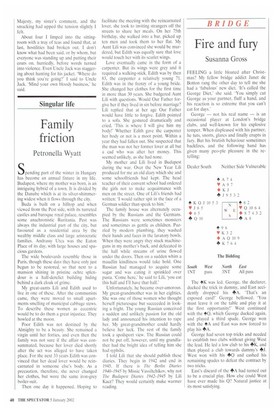Family friction
Petronella Wyatt
Spending part of the winter in Hungary has become an annual fixture in my life. Budapest, where my mother was born, is an intriguing hybrid of a town. It is divided by the Danube which is at its silver-shimmering widest when it flows through the city.
Buda is built on a hilltop and when viewed from the Pest side, with its turreted castles and baroque royal palace, resembles some anachronistic Ruritania. Pest was always the industrial part of the city, but favoured as a residential area by the wealthy middle class and large aristocratic families. Andrassy Utca was the Eaton Place of its day, with large houses and spacious gardens.
The wide boulevards resemble those in Paris, though these days they have only just begun to be restored, so that next to a mansion shining in pristine ochre splendour is a half-derelict building hiding behind a dark cloak of grime.
My great-aunts Lili and Edith used to live in one of these. After the communists came, they were moved to small apartments smelling of municipal cabbage stews. To describe these women as eccentric would be to do them a great injustice. They howled at the moon.
Poor Edith was not destined by the Almighty to be a beauty. She remained a virgin until her forties, and even then the family was not sure if the affair was consummated, because her lover died shortly after the act was alleged to have taken place. For the next 33 years Edith was convinced that her dead lover would be reincarnated in someone else's body. As a precaution, therefore, she never changed her clothes, but wore the same iron-grey boiler-suit.
Then one day it happened. Hoping to facilitate the meeting with the reincarnated lover, she took to inviting strangers off the streets to share her meals. On her 75th birthday. she walked into a bar, picked up ten men and took them to her flat. My Aunt Lili was convinced she would be murdered, but Edith was equally sure that love would touch her with its scarlet wings.
Love eventually came in the form of a carpenter. But its wings were grey and it required a walking-stick. Edith was by then 83, the carpenter a relatively young 71. Edith was in the frenzy of a young bride. She changed her clothes for the first time in more than 30 years. She badgered Aunt Lili with questions. Would Our Father forgive her if they lived in sin before marriage? Lili replied that at her age Our Father would have little to forgive. Edith pointed to a sofa. She gestured dramatically and cried, 'This is where I will give him my body!' Whether Edith gave the carpenter her body or not is a moot point. Within a year they had fallen out. She suspected that the man was not her former lover at all but a cad who was after her money. This seemed unlikely, as she had none.
My mother and Lili lived in Budapest during the war. Over the New Year Lili produced for me an old diary which she and some schoolfriends had kept. The head teacher of their convent school had ordered the girls not to make acquaintance with men on the street. One of Lili's friends had written: 'I would rather spit in the face of a German soldier than speak to him.'
The family house was alternately occupied by the Russians and the Germans. The Russians were sometimes monsters and sometimes as gentle as children. Puzzled by modern plumbing, they washed their hands and faces in the lavatory bowls. When they were angry they stuck machineguns in my mother's back, and defecated in the hall while streams of urine flowed under the doors. Then on a sudden whim a maudlin kindliness would take hold. One Russian had managed to acquire some sugar and was eating it sprinkled over pasta. tome here,' he said to Lili, 'you eat this half and I'll have that half.'
Unfortunately, he became over-amorous. My great-grandmother was in her eighties. She was one of those women who thought herself picturesque but succeeded in looking a fright. The young Russian conceived a sudden and unlikely passion for the old lady and announced his intention to rape her. My great-grandmother could hardly believe her luck. The rest of the family took a spoilsport view. The Russian could not be put off, however, until my grandfather had the bright idea of telling him she had syphilis.
I told Lili that she should publish these diaries. They begin in 1942 and end in 1945, If there is The Berlin Diaries 1940-1945 by Missie Vassiltchikov, why not The Budapest Diaries 1942-1945 by Lili Kacz? They would certainly make warmer reading.






















































 Previous page
Previous page